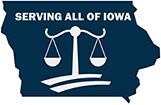Last Updated: 8/10/2023
Iowa is one of three states in the nation that has no motorcycle helmet law. However, despite the fact that a motorcyclist may be within his or her legal right to not wear a helmet, those who are not wearing a helmet and suffer a head injury in a motorcycle crash may be held partially liable for their wounds.
It is a well-known fact that wearing a helmet can prevent traumatic brain and head injuries in the event of an accident; choosing not to wear a helmet, then, may be an act of negligence.
Accident Scenarios Where Helmet Use May Affect Liability
The use of a helmet will not be a relevant factor in determining liability in all accidents; rather, liability will probably only be impacted in the event that the injury you have sustained is a head or brain injury. For example, if you were in a motorcycle accident and suffered an injury to the lower body, then the fact that you were not wearing a helmet would be irrelevant because you would have suffered the leg injury regardless.
On the other hand, if you the injury that you suffered was a head or brain injury that could have been prevented had you been wearing a helmet at the time of crash, then you may be considered partially negligent.
On the same token, if you were wearing a helmet at the time of the crash, then this can help to show that despite no legal requirement, you were exercising caution and care while riding.
Comparative Fault Laws in Iowa
A negligent act is one that fails to exercise the proper degree of care and is not necessarily something illegal. As such, while you have no legal requirement to wear a helmet, the defense may argue that a reasonable person would have worn a helmet while riding a motorcycle, and that because you did not, you did not exercise a proper degree of care.
If you are found to be partially negligent for the injuries that you have sustained based on your lack of helmet, then a number of damages that you can recover will be affected. Under Iowa’s comparative fault laws, a number of damages that you can recover will be “diminished in proportion to the quantity of error attributable” to you.
Because of this law, it is paramount that you do everything you can to prove the fault of the other party, and prove that your injuries would have been incurred regardless of the fact that you weren’t wearing a helmet, or that your injuries would have been worse had you not been wearing a helmet.
How to Prove the Negligence of the Other Driver
Negligence is the most important component of a motorcycle accident claim. If your accident would not have occurred but for the negligence of the other person, you need to collect evidence to prove it.
Types of evidence that you can use to prove negligence include the following listed below.
- Police reports
- Lab tests (if the other driver was driving while intoxicated/impaired)
- Witness testimony
- Photo evidence
- Video evidence
- Physical evidence
Remember, the other driver will be trying to prove your negligence as well. As such, you’ll want to go to the hospital after even a minor motorcycle accident and secure representation immediately after that.
Contact a Motorcycle Accident Attorney Today
Following a motorcycle accident, your use—or lack thereof—of a helmet may affect your motorcycle crash claim. To ensure that you recover your full damages amount, consult with an attorney. At Walker, Billingsley & Bair, we’re ready to advocate for you. Call us today at (888) 435-9886 or fill out our online contact form.


